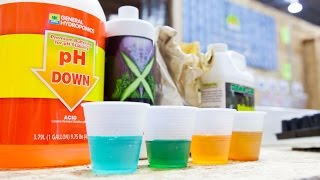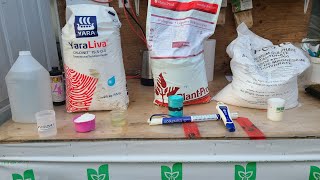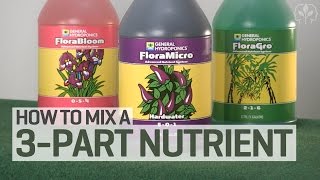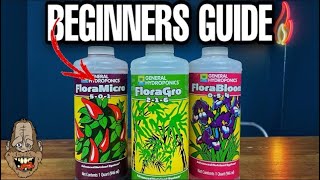
A Beginners Guide: Hydroponic Nutrients
 Nutrient management is the crux of a healthy hydroponic system. (Read the article: https://university.upstartfarmers.com/courses/2040-hydroponic-nutrients-fertilizers )
Nutrient management is the crux of a healthy hydroponic system. (Read the article: https://university.upstartfarmers.com/courses/2040-hydroponic-nutrients-fertilizers )
For even more information about Hydroponic Nutrients, enroll in our Upstart University program and check out our Hydroponics Nutrients & Fertilizers course at https://university.upstartfarmers.com/courses/2040-hydroponic-nutrients-fertilizers/?ref=43
Great nutrient management occurs when growers are:
1) Aware of all necessary plant nutrients and where they come from
2) Supplying adequate nutrients in correct ratios to plants
3) Monitoring and measuring how much of each plant nutrient is available in their system at any given time
4) Making economic and work-flow conscious decisions about how to source and supply nutrients.
Most plants (and all of the crop plants that you’re likely to grow) rely on 16 nutrients to grow and reproduce. Of these, three are available through water uptake and gas exchange (the air): Carbon through CO2, hydrogen, and oxygen.
The remaining thirteen nutrients are the mineral nutrients delivered to plants through nutrient solutions (dissolved fertilizer).
The overall nutrient level in a solution is measured in EC, or electrical conductivity.The units used to measure EC are ppm or mS/cm, although ppm is used more commonly for measuring total dissolved solids. That’s a different measurement for a different blog post. Hydroponics really need to understand the second unit, mS/cm. This is often just expressed as the “EC level”. (For example, “The EC of the solution is 1.8,” with no unit.)
Ideal mS/cm is typically between 1.2 and 3.3. There’s a broad range of acceptable EC levels, and each crop has an ideal range.
Supplying the correct ratio of nutrients in adequate levels is only half of the nutrient management picture; the other task for farm managers is to keep those nutrients available to plants, and the main factor influencing that availability is pH.
Nutrients are soluble at different pH values. Check out an absorption chart (there’s one in the article version of this video) to learn more.
Adjusting pH to your ideal range can be done with pH Down or pH Up, which are acids or bases (respectively). Never add both at once!
There are two main forms of fertilizer: dry and liquid.
Dry fertilizer is mostly used in commercial settings because there’s a lot less to ship (you’re not shipping water), making it more cost effective. You can also tailor dry fertilizer better to your needs, because it comes in separate parts.
Liquid fertilizer is simple to use and great for home and hobby systems. It’s easier to manage since you can just add a certain amount of one liquid to your system water, but it’s more expensive to ship. (Most people on a small scale only buy a little at a time though, so shipping is less important.)
The best way to mix a solution is to follow the manufacturer’s instructions.
If you’re not using an auto-doser, you’ll still mix it the same way, but you’ll add it to your system bit by bit in equal ratios and test it until it’s at the right level. You’ll get better and better at this over time.
There are a multitude of handheld measuring devices and testers. Our favorite suppliers are Blue Lab, Hanna Instruments, and AutoGrow. We’ve used each of these and are currently using AutoGrow’s NutriTest, a handheld meter which measures both EC and pH with the same device. There are a variety of options out there.
Subscribe to this channel to learn more!
—————–
Timestamps/What’s Covered:
00:24 The 16 Plant Nutrients
04:27 Electrical Conductivity
06:39 pH
09:22 Fertilizer
12:00 Nutrient Solubility
14:00 Mixing Solutions
17:13 Measurement Devices
18:10 Review
—————–
Visit our store for growing supplies and nutrients: https://shop.zipgrow.com/collections/growing-supplies-and-nutrients
Don’t forget to like and subscribe to our channel and pop your questions in the comments below.
—————–
Connect with us:
Website: https://zipgrow.com
Facebook: https://www.facebook.com/ZipGrowTM/
Instagram: https://www.instagram.com/zipgrowinc
LinkedIn: https://www.linkedin.com/company/zipgrow-inc/
——————
Learn:
UpStart University- https://university.upstartfarmers.com
Blog- https://zipgrow.com/zipblog/
Guides & Manuals: https://zipgrow.com/grow-guides/
——————
Shop:
https://shop.zipgrow.com/
Music by: Scott Gratton
http://freemusicarchive.org/music/Sco…



What was the name of company that supplies strawberry mix, please?
Was123456
THANK YOU SO MUCH! Im a beginner. Was truly spending time SEARCHING for anyone offering reliable information on exactly what you covered! Your explanations are easy for me to understand and I am very grateful!
Cheers & Thanks for the useful Video for a Beginner like me
where to find the crop production list?
Oke! a very clear video. However I use my pond as a waterreservoir. The pond contains fish. Does somebody know the effects of adding fertilizers to the pond and the effect on fish?
Wish we could post pics of our grows
I just got took to school.
Great help thank you 🎉 who needs dirt lol 😂
Very helpfull thanks!
TY SIR.👍
insanely well explained!!!
Thank you so much for this. Anyone can tell me how, but thank you for telling me why! I am on my second grow and followed a guide strictly. Now for my second I truly want to know why we use these nutrients and how to begin to identify when one is needed. Thank you again!!!
Great vid!!!! The best I’ve found so far!!! Thanks a lot for sharing!!! 👍🏻👍🏻👍🏻👍🏻👍🏻👍🏻
Really good info 💯
I’m growing narrow leaf milkweed in my hydro system if anyone is experienced in this I would love to pick your brain
If only all YouTube videos were like this. No fluff, no flair, organized presentation, appropriately touched on every relevant topic, and provided additional resources and references.
wow, now this is detailed af… great job!
Excellent breakdown on nutrient solutions and understanding what your meter readings are saying.
Bravo! 👏🏻 Thank you for this. Best explanation ever.
Great video to learn and understand hydrophobic nutrition. I wanted to know if your PH is too high, how can you bring it down if you advise to stay with one of either PH up or PH down?
It is fascinating how complex this is, yet in nature… plants just grow.
Hello! Good videos! I have a question. Why my calcium participate when im mixing the reservoir? I know when air bubbleing takes out co2 from water so it raise ph, but every hydroponics need some kind of airstone in the reservoir, doesnt matter its a dwc or nft system. So my question is what the best practice when mixing nutrients? I wait 1 day with tap water to get stagnated, and i air bubbled it too. Than ph go up 8.0 . Than i add a bit of nitric acid 60%, to get ph down to 6.5. Than i add a solution A (npk 6,14,30+epsom salt) stock solution, than waiting for another day and bubbleing it. Than next day i add the calcium nitrate stock solution B, than add more nitric acid to make ph 6.0. Than suddenly ph starts to rise again and calcium participate, and make cloudy water. The water was on room temperature all the time, ec went up after mixing all nutes to 900ppm (what is good), so dont know what im doing wrong pls help. How to avoid this participated clody water. Thanks.
Pls can i use agric lime as a source of calcium solution
Christy Han🎉
Wow so detailed and yet easy to understand ! Kudos
are they the same to aeroponics?
good teacher thanks
I just want to know what nutrients go with what plant. Home gardening Kratky Method. Help!!!
thank you this information help me lots
Hey man, thanks a lot for your vdeos, it has been so hellpfull to watch them, i need to ask, how much water solution can i put to a 1000 lettuce plant?? n hydroponic system
Fantastic explanation
And recap at the end is like a professional instructor 👍👍👌
Complete information about solution mixing
No sound!!!! 🙊🙊🙊
can we please just grab the mix and go bro. grow bro
Really nice video 😊, thank you very much, can you please make one that covers the routine and best practices needed for hydroponic growers to follow, no video covers that, they present equipment fertilizers or explain concept, but no daily process verification and steps to follow
Thank you
Can I mix a measured portion of ammonium nitrate with tomato formula to make a veggie mix for peas, and could i create a dry mix of the two or would it be uneven? i’ve heard some companies have processes to make the different ingredients uniform
Thank you! a pity you have to enroll in an university to get a 16-pages document.
So how should we mix them to get a small plant to flower?
Do you still add magnesium if your npk already contains magnesium?
@1:51
Hello, I am brand new to indoor hydroponics growing and have some questions. I have some odd things going on with my ec and ph levels that just recently come up. I’ll preface and say that I’ve been doing this about a month and a half.
Things started off fine but in the last week the ec and ph are constantly rising.
From everything I’ve read that means the nutrient content is too high. I am starting to see what looks like nutrient burn but being brand new to this I’m only guessing.
I’ve done a complete water change (2 in 2 days) and got the ec down to .4 which held steady but the ph jumped quite a bit.
I’m hoping there’s someone out there that would be willing to chat via email (or however) to look at pics of my setup, look at the readings I’ve gotten that I have written down, and pics of the plants/roots themselves to see what I am doing wrong.
I know this is a lot to ask so thank you up front.
I have 1 bush bean, 2 cherry tomatoes, and 1 romaine lettuce plants.
I would like to expand a bit, but not until I get this straightened out and get sine more knowledge.
Awesome video sir you definitely get a sub from me.
Organic asid ph mentain and phosphoras+ zink sulphate bonding crac
Why is the type "C" stuff not sold already incorporated in the type "A", If both dissolve why keep them separate? (Or do you need to vary the relative concentrations a lot by plant type?)
Why didn’t you use twice as much water in one of the rwo buckets if in fact three buckets needed equal parts water?
Thanks a lot !!!!
Lots of work for the home grower. I’d say stick to living soil. Fool proof.
Whay do you do if you EC is high and your PH is fine? Do you jist let the plants absorb the nutrients that are in there and let the levels drop naturally?
Very informative 👍🏻